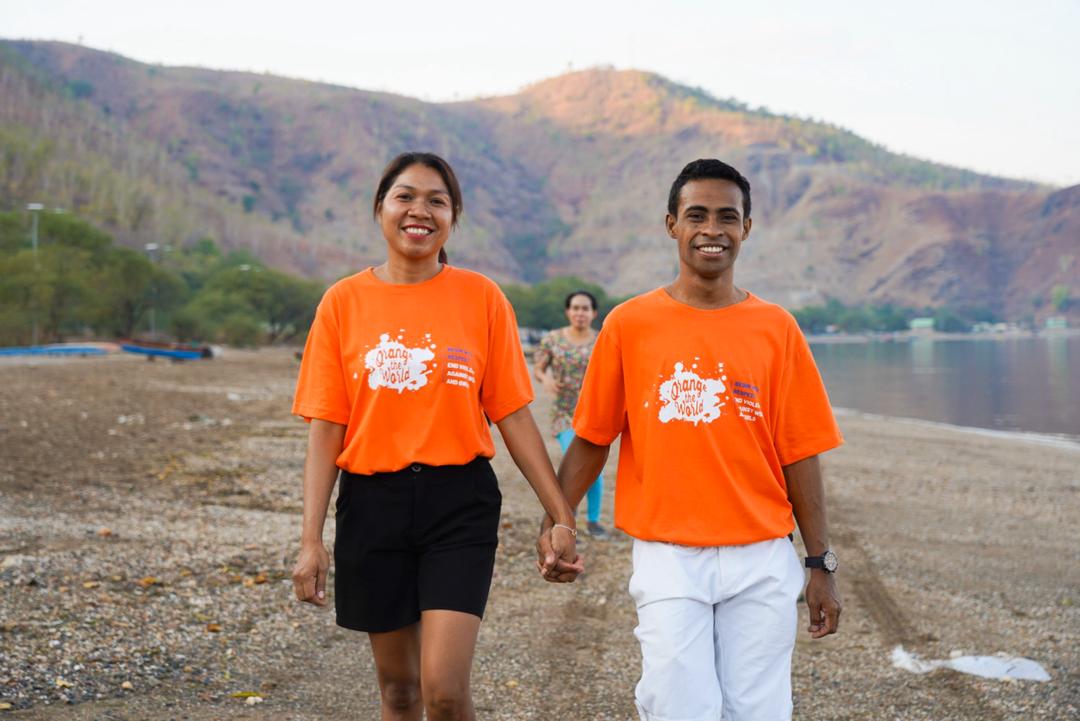Youth, civil society and artists come together to combat gender-based violence.
JDN’s report gives voice to survivors’ stories and shows that in Timor-Leste, the first step is speaking out.
By Alex Ray/ UNDP Timor Leste
The poster “Case 36 - On the Mikrolet,” described an all-too familiar scene for women in Timor-Leste – sexual assault on public transport. This time however, the normalised behaviour was being called out.
Case 36 and 11 other posters featured as part of the United Nations Development Programme (UNDP) Timor-Leste’s closing ceremony for the 16 Days of Action Against Gender-Based Violence (GBV) on December 10, 2019.
The posters were samples from 80 stories contained in a report by Timorese youth NGO Juventude ba Dezenvolvimentu Nasional (JDN) titled ‘The Spoken Experiences of young Women in Dili of Sexual Abuse, Sexual Harassment, Rape, Incest and Domestic Violence.’
Other cases covered sexual violence of all forms, in varying circumstances, from mikrolet (public bus) assaults, to rape and social media harassment, along with survivors attempts to combat GBV. JDN’s report gives voice to survivors’ stories and shows that in Timor-Leste, the first step is speaking out.
“JDN’s campaign against sexual harassment educates both women and men to know how deeply sexual violence scares and traumatizes women, acts against our dignity and it also affects our mental health,” said Ines da Costa, a volunteer for JDN.
The forum theater involved the audience as solution-makers
Timor-Leste has high rates of gender-based violence (GBV). Around 40% of women who have had an intimate relationship have been physically abused by a male partner.
A traumatised and patriarchal society, high unemployment, and rigid traditional values contribute to a melange of factors resulting in wide-spread abuse – particularly of women and girls – in the home, at work, at schools and in public transport.
Correspondingly UNDP – one of the core contributors to the UN’s 16 Days of Action campaign – campaigning targeted the above four areas of everyday experiences. UN Women, UNICEF and the ILO also contributed specialist experience in different fields where gender rights impact our lives.
The campaign began in the early morning of the 25 November with a public procession who “walked the talk” along Dili’s beachfront to a public self-defence training session at the picturesque Cristo-Rei peninsula.
'Walk the Talk' along Dili's beachfront
Throughout the following 16 days, interviews with Timorese discussing gender equality and GBV circulated on social media, and civil society specialists came together to discuss masculinity in Timor.
For the closing ceremony however, the UN turned to local performing artists to capture the raw emotions and destruction created by GBV.
Alongside the JDN stories on display, the event featured art by female survivors of GBV supported by NGO Buibere Nia Riska, as well as youth entrepreneurs challenging gender stereotypes in Timor.
Opening remarks by UN Resident Coordinator Roy Trivedy and EU Ambassador Andrew Jacobs emphasised the need to recognise GBV as a fundamental human right being violated on a mass scale around the world.
The event began with “forum theatre” by the Tertil theatre group, who recreated common scenes of family-based GBV in Timor on stage. Freeze-frame moments coordinated by “the Joker” MC invited the audience to join the performance to suggest solutions to the problem at hand. Men and women volunteered opinions with the audience cheering on and giggling.
“Humour helps the audience overcome nerves and the sensitivity of the theme and make the solutions seem closer to them,” said Titiso Kour-Ara, coordinator of the performance.
The pinnacle of the closing performance
As the sun set, the stage lights focused in on local musician Noise, who took the stage with collaborator and painter, Tony Timor. Haunting vocals and hypnotic percussion set the scene for Tony Timor’s live painting –depicting the complexities and contradictions in narratives around GBV. Completing the spirit of collaboration, the performance and music was composed based on excerpts from the real-life stories in JDN’s report.
Between the tick-tock of Noise’s cowbells and the hiss of Tony’s spray cans, the Forum Theatre actors re-emerged, clad in traditional Timorese Tais fabrics. Led by a matriarchal figure bearing burning flames, their chants brought the performance back to the simplicity of respect for women, in all their forms.
The actors embodied the climbing tension of the performance by raising their “leading light” on their shoulders – holding a moment for the audience to reflect on the position of women in their lives.
Local musician Noise with collaborator and painter, Tony Timor
In recent years Timor-Leste has seen increased awareness around GBV. Multiple UN programs have supported GBV training for law and justice actors like the PNTL, Public Prosecutors and prison guards. A key advance in assisting survivors of GBV has been the expansion of Mobile Courts to rural areas, where 53% of cases have been related to GBV.
The 16-day campaign was generously supported by the European Union, who have partnered with the UN in the global Spotlight Initiative which aims eliminate all forms of violence against women and girls by 2030.
© Yuchi Ishida/UNDP Timor-Leste
In Timor-Leste, the first phase of the Initiative will spend nearly US$10million across six pillars of action towards ending violence against women and girls. Actions in this phase will directly benefit 341,231 people and focus on the districts of Bobonaro, Ermera and Viqueque.
Examples of the initiative’s actions include: improving the capacities of health and justice service providers responding to GBV; facilitating worker-employer dialogue; addressing gaps in labour laws; improving school curricula and developing the organizational capacities of women’s groups.
"Respect woman because she is a human" - (Tony Timor)

 Locations
Locations




